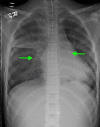Altered Mental Status and Respiratory Failure in an 11-Year-Old Female
- PMID: 34168928
- PMCID: PMC8215722
- DOI: 10.7759/cureus.15164
Altered Mental Status and Respiratory Failure in an 11-Year-Old Female
Abstract
Congenital central hypoventilation syndrome (CCHS) is a rare disorder that results in profound hypoventilation that is most prominent during periods of sleep. Caused by a genetic mutation in the PHOX2B gene, CCHS typically presents in the newborn period with symptoms of hypoventilation. However, there is a subset of patients with the same genetic mutation who present much later in life, which is termed late-onset congenital central hypoventilation syndrome (LO-CCHS). The reason for its late presentation is unclear but is often dramatic. Given its rarity, the diagnosis can be difficult to establish but can be accomplished by using a systematic approach. Here, we present a case of LO-CCHS in an 11-year-old female who presented with respiratory failure and altered mental status.
Keywords: central congenital hypoventilation; hypoventilation; late onset congenital central hypoventilation syndrome; phox2b; tracheostomy.
Copyright © 2021, Ribeiro et al.
Conflict of interest statement
The authors have declared that no competing interests exist.
Figures
References
-
- Congenital central hypoventilation syndrome. Ramanantsoa N, Gallego J. Respir Physiol Neurobiol. 2013;189:272–279. - PubMed
-
- An official ATS clinical policy statement: Congenital central hypoventilation syndrome: genetic basis, diagnosis, and management. Weese-Mayer DE, Berry-Kravis EM, Ceccherini I, Keens TG, Loghmanee DA, Trang H. Am J Respir Crit Care Med. 2010;181:626–644. - PubMed
-
- Polyalanine expansion and frameshift mutations of the paired-like homeobox gene PHOX2B in congenital central hypoventilation syndrome. Amiel J, Laudier B, Attié-Bitach T, et al. Nat Genet. 2003;33:459–461. - PubMed
Publication types
LinkOut - more resources
Full Text Sources

